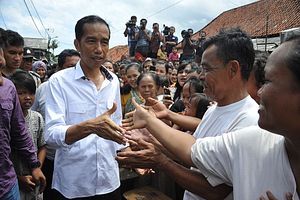In the beginning of 2020, defenders of human rights were alarmed when Indonesia’s Attorney General Sanitiar Burhanuddin claimed that the Semanggi Tragedies do not constitute gross human rights violations. The Semanggi Tragedies, also known as Semanggi I and II, were shootings that occurred during student protests in November 1998 and September 1999. During Semanggi I, at least 17 people were killed and 109 were injured. During Semanggi II, the number of the injured doubled to 217 and at least 11 were killed. The shootings were carried out by police and military personnel. The attorney general’s claim further contributes to the already-heightening skepticism toward the Indonesian government’s commitment to human rights protection.
The issue of human rights protection and weakening of the country’s democracy is not a new subject of criticism. Freedom of expression has not been fully upheld despite the government’s promises to strengthen the nation’s democracy, which was one of the demands of the Reformation agenda during the collapse of the New Order. A survey by LSI in May-June 2019 showed that 43 percent of respondents do not feel safe about voicing their opinions. The need to maintain political stability and security, as well as charges of treason or defamation, is often used to legitimize the silencing of dissent, as seen in the arrest of Robertus Robet, who criticized the military, and the arrest of many Papuan activists.
Repression was also used by the police to handle the student-led mass protests in late September 2019, which condemned the drafting of the revision to the Penal Code and revision of the Corruption Eradication Commission Law. The National Commission on Human Rights stated that 30 protesters were arrested between September 24 and 26, while more than 600 were detained between September 30 and October 1. Journalists were also detained, intimidated, and forced to erase their records of the handling of the protests.
The government has also failed to fully protect minority groups from discrimination. The case of racism against Papuan students in Surabaya reflects the poor institutionalization of equality and anti-discriminatory policies. Persecution of religious minorities has also been a major cause of concern. From January to November 2019, the country saw at least 31 violations of religious freedoms — with the majority of the cases hurting religious minorities. It seems that the Indonesian government has yet to grasp the concept that democracy is not merely a rule by the majority, but also one that protects minority rights.
The legal framework to prevent and address sexual violence, which is known to affect many women in the country, has been continuously stalled for two years. A bill on the elimination of sexual violence (RUU PKS), proposed in 2017, has not gained significant support in the legislature. The government seems to be in more favor of empowerment for women that is based on education and economic means. The fundamental aspect of gender equality and justice is often neglected.
It is not a stretch to say that the government prioritizes macro and materialistic aspects of development over human rights at the micro level. The country saw at least 1,069 land conflicts caused by land clearing in 2017 to 2018. President Joko “Jokowi” Widodo’s statements regarding his vision for his second term reflect his ambition to amp up infrastructure projects and investment. This ambition, if not carried out with regards to human rights protection, may further marginalize the economically vulnerable.
Jokowi needs to remember that he benefited from narratives about his commitment to human rights in the 2014 and 2019 elections. These narratives swayed voters supportive of democracy and human rights his way, providing him with an upper hand against Prabowo Subianto, who was allegedly involved in human rights violations during the New Order. In his Nawacita, Jokowi promised to investigate and resolve gross human rights violations — the May 1998 Riots, the Trisakti-Semanggi Tragedies, the abductions during the New Order, the Talangsari Incident in 1989, the Tanjung Priok Massacre in 1984, and the Tragedy of 1965, among others. However, the government has only managed to initiate reconciliation programs, which does not involve formal investigation and punishment through the judiciary. The recent appointment of Prabowo as minister of defense furthered the pessimism around the future of democracy and human rights in the country.
The Indonesian government can no longer avoid discussion about this issue. The Indonesian youth, who showed their spirit for democracy in the late September student-led mass protests, are unlikely to be persuaded by words without active commitment and policies to directly address their concerns. The government’s trajectory on the matter over the past five years has made it difficult for them to not be skeptical. The promise of infrastructure development, which is the central theme of Jokowi’s second term, is also unlikely to appease the masses who participated in the late September mass protests as their demands were not tied to economic grievances. The only way for the government to reduce distrust is to listen and step up its commitment to human rights as soon as possible.
There are several bills that we should watch in Jokowi’s second term for signs of progress – or regression – on rights issues. While the Elimination of Sexual Violence Bill has made its way to the National Legislation Program (Prolegnas), it is too soon to say that the bill will certainly be passed in the next couple of years. The Prolegnas also includes a contested land bill, a bill on the resolution of agrarian conflicts, a bill on the preservation of the family, and a revision draft for the Law on Electronic Information and Transactions (UU ITE), among its 248 listed bills. The public should actively scrutinize the developments of these bills as they may threaten the people’s fundamental and democratic rights. Currently, the detailed provisions of these bills are yet to be widely accessible to the public.
Fadhilah Fitri Primandari is a final year political science student at Universitas Indonesia.
































